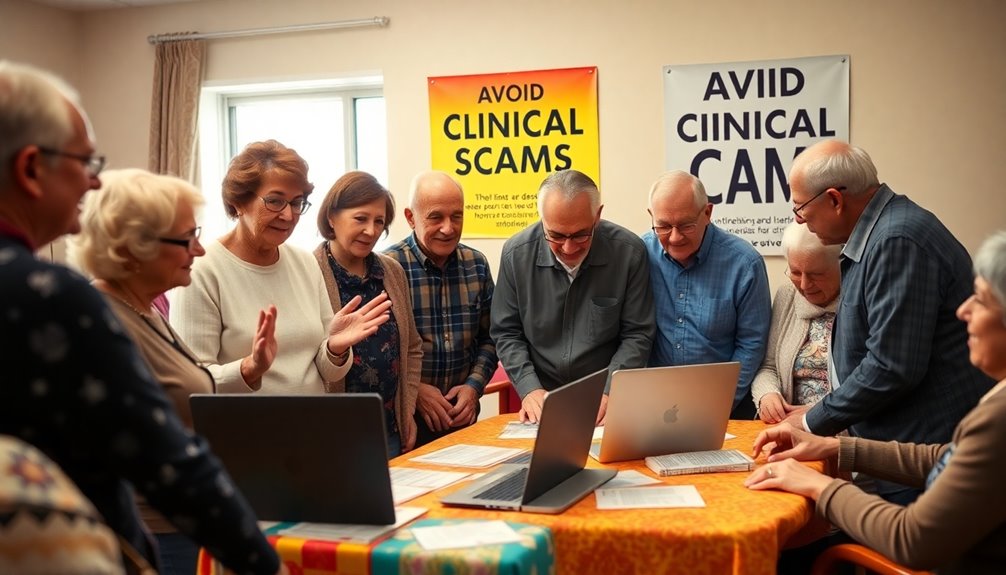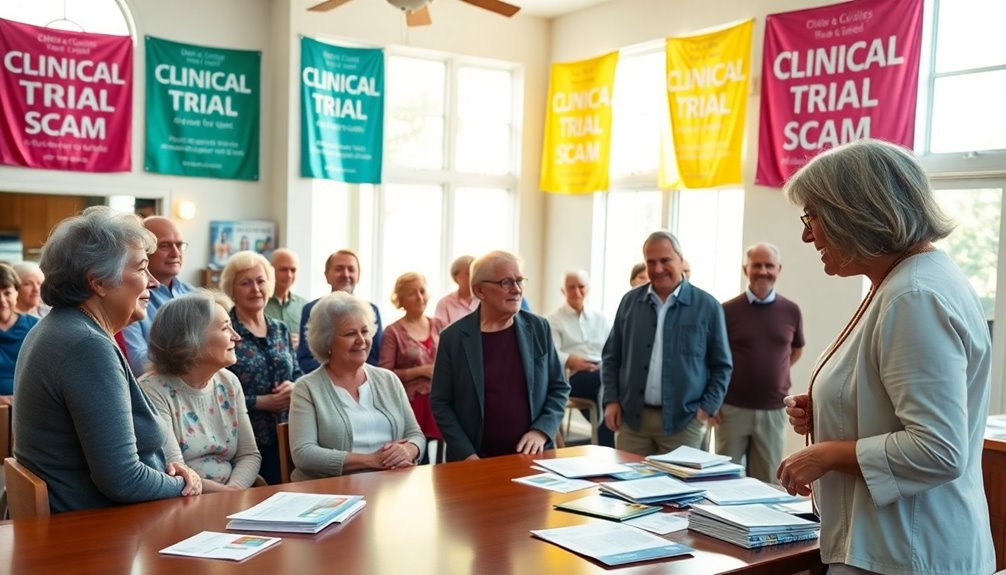To avoid clinical trial scams, you need to stay vigilant. Legitimate trials won't ask you for money to participate or sensitive information like your Social Security number. Watch out for poorly designed websites and overhyped promises of free medical services. Always verify trials on ClinicalTrials.gov and consider using secure payment methods. If something doesn't feel right, trust your instincts and report it to the FTC. Learn from community experiences, as many have faced scams due to a lack of research. By being cautious, you can protect yourself, and there's plenty more to uncover about staying safe in clinical trials.
Key Takeaways
- Always verify the legitimacy of clinical trials through ClinicalTrials.gov to ensure they are credible and trustworthy.
- Be wary of websites that appear unprofessional or poorly designed, as they may indicate a scam.
- Genuine clinical trials do not charge participants for access or information; participation should be free.
- Protect your personal information; legitimate trials will never ask for sensitive details like your Social Security number.
- Conduct thorough research and trust your instincts; if something feels off, consider it a red flag.
Understanding Clinical Trials
Clinical trials play an essential role in advancing medical science while offering participants potential financial compensation.
By joining a trial, you can contribute to groundbreaking research and potentially earn payments ranging from $1,000 to $2,500, particularly in Phase III trials.
It's crucial to understand that legitimate trials won't charge you for access or information. They seek volunteers to test new treatments, medications, or procedures, all while prioritizing your health and safety.
However, with the increase in research studies due to COVID-19, some fraudulent trials have emerged. Always do your due diligence before participating; investigate the trial's legitimacy and know that your health is paramount.
Engaging in genuine trials can be a rewarding experience, both personally and financially.
Identifying Scam Characteristics

While engaging in legitimate clinical trials can be beneficial, it's equally important to recognize the characteristics of scams that may target potential participants.
Be wary of websites and promotional materials that seem unprofessional or poorly designed. Scammers often ask for sensitive information, like your Social Security number or financial details, which legitimate trials don't require.
Promises of free medical tests or care can also be misleading, so always scrutinize such offers. If something feels off, trust your instincts.
Conduct online searches for the trial name, including terms like "scam" or "complaint," to uncover any red flags.
Safe Participation Guidelines

When considering participation in a clinical trial, it is vital to follow specific guidelines to guarantee your safety and protect your interests. Start by ensuring the trial is legitimate; never pay to join. Use ClinicalTrials.gov to verify details. Secure payment methods are important—checks are safer than direct deposits.
Here's a quick reference table to help you stay safe:
| Guideline | Details |
|---|---|
| No Fees | Legitimate trials never charge participants. |
| Verify Legitimacy | Check ClinicalTrials.gov for accurate info. |
| Report Suspicious Activity | Notify the FTC about questionable trials. |
Community Experiences Shared

Engaging in clinical trials can be a rewarding experience, but it's important to learn from others who've walked that path. Many participants share valuable insights that can help you navigate the process safely.
Here are some community experiences to reflect upon:
- Vigilance is Key: Many have reported falling for scams due to misleading advertising.
- Trustworthy Sources: Positive experiences often come from trials run by reputable medical professionals.
- Be Cautious: Some participants regret not doing thorough research before joining a trial.
- Share Your Story: Engaging in community discussions can provide warnings and tips for others.
Available Resources and Support

Finding reliable resources and support is essential for anyone considering participation in clinical trials. You can turn to the National Institutes of Health (NIH) for a wealth of information on legitimate trials.
The COVID-19 Prevention Network also provides updates on related studies, helping you stay informed. Engaging with the Senior Planet Community allows you to discuss health and safety concerns with others who share your experiences.
Don't forget to subscribe to newsletters that keep you updated on new developments in clinical research. Additionally, look for educational programs focusing on health literacy and scam prevention. Understanding the concept of financial literacy can also help you navigate the complexities of clinical trial participation.
Utilizing these resources can empower you to make informed decisions and protect yourself from potential scams in the clinical trial landscape.
Frequently Asked Questions
What Types of Clinical Trials Are Available for Seniors?
You’ll find various clinical trials for seniors, including studies on medication effectiveness, lifestyle interventions, and disease prevention. Many focus on conditions like Alzheimer’s, heart disease, and diabetes, aiming to improve quality of life and health outcomes. In addition to these studies, researchers are also examining the osphena safety for older women, as this medication addresses specific issues related to postmenopausal women’s health. These trials help to ensure that any potential benefits of the medication outweigh the risks, particularly in older populations who may have multiple health concerns. Overall, the goal is to foster a comprehensive understanding of how various treatments can enhance health and well-being in seniors.
How Do I Find Local Clinical Trials Near Me?
Wondering how to find local clinical trials? Start by checking ClinicalTrials.gov for listings in your area. You can also ask your healthcare provider for recommendations or search local hospitals for ongoing studies.
Can I Withdraw From a Clinical Trial at Any Time?
Yes, you can withdraw from a clinical trial at any time without penalty. Just inform the study coordinator of your decision, and they'll guide you through the process. Your well-being is always the priority.
Are There Age Restrictions for Participating in Clinical Trials?
In the world of clinical trials, age can be a gatekeeper. You'll often find that many studies have specific age criteria, but some trials welcome participants from various age groups. Always check eligibility requirements before applying.
What Should I Do if I Suspect a Clinical Trial Is a Scam?
If you suspect a clinical trial is a scam, research the trial thoroughly, check for red flags like financial requests, and report your concerns to the Federal Trade Commission. Trust your instincts and stay cautious.
Conclusion
In the world of clinical trials, it is crucial to keep your wits about you. By knowing the signs of scams and following safe participation guidelines, you can navigate this landscape confidently. Don't let yourself be caught off guard; it's better to be safe than sorry. Remember, with the right resources and support, you can make informed choices that benefit both your health and finances. So, stay vigilant and don't hesitate to ask questions along the way!









